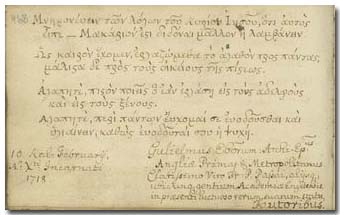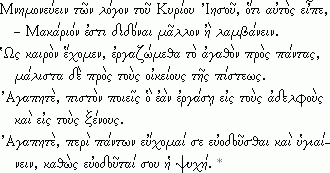

Gulielmus Ebor[acensi]um Archi-Ep[iscop]us Angliae Primas &
Metropolitanus Clarissimo Viro Fr[ancisco] P[ariz] Papai, alijsque
ubicunque gentium Academiae Enyedensis, in praesenti luctuoso
verum suarum statu, Fautoribus.
10 Kal. Februarij, A[nn]º Xti Incarnati 1718.
|
* Acts 20:35: Vulgate: “meminisse verbi
Domini Iesu quoniam ipse dixit beatius est magis dare quam
accipere”.
Gal 6:10 (the textus receptus reads correctly
echomen instead of hechomen): Vulgate: “ergo dum
tempus habemus operemur bonum ad omnes maxime autem ad
domesticos fidei.”
3Jn 1:5: Vulgate: “fideliter facis quicquid operaris in
fratres et hoc in peregrinos”. Also quoted by John White on
p. 461.
3Jn 1:2: Vulgate: “carissime de omnibus orationem facio
prospere te ingredi et valere sicut prospere agit anima tua”.
|
|
|
|
Remember the words of the Lord Jesus, how he said, It is
more blessed to give than to receive.
As we have therefore opportunity, let us do good unto all men, especially
unto them who are of the household of faith.
Beloved, thou doest faithfully whatsoever thou doest to the brethren, and
to strangers.
Beloved, I wish above all things that thou mayest prosper and be in
health, even as thy soul prospereth. *
William, Archbishop of York, Primate and
Metropolitan of England to the illustrious Ferenc Pápai Páriz, and
to the other members of the College of Nagyenyed, wherever they
be, who are in this mournful moment the supporters of the same
College.
[York?] In the year 1718 of the
incarnation of Christ, on the tenth day before the calends of
February.
|
p.
468. York, February 3, 1719
Dawes, William VII, Sir
(1671-1724), English pastor,
Archbishop of York
William Dawes was born in Lyons near to Braintree (Essex) on
September 12, 1671, in a baronet family which, although lost most
of their riches during the civil war, sent regular supports to the
royal family in exile. William learned from the age of nine in the
Merchant Taylors’ School in London. At the age of 15 he already
excelled in Hebrew. He was hardly 18 when he wrote his work in
verse: The Anatomy of Atheisme,
and his eminent The Duties of
the Closet in prose. In 1687 he immatriculated in St. John’s College
in Oxford, of which he also became a fellow. Later he was also
admitted as fellow of St. Catharine’s Hall in Oxford. He was
married in 1695. As he was too young, he received his M.A. degree
on royal decree (per lit. reg.). In 1696 he graduated in theology (D.D),
and became the permanent pastor of William III (1688-1702) and
later court pastor of Anne Stuart (1702-1714). From 1698 he was
canon of the Cathedral of Worcester. He made many efforts in the
interest of St. Catharine’s Hall of which he was a master between 1697
and 1714. His popularity is indicated by the fact that he was
elected pastor in the village of Bocking near to his estates. Here
he introduced the custom to take the Lord’s Supper not only on the
three great feasts, but in every month. From February 1707/08 he
was Bishop of Chester, then from 1704 until his death Archbishop of
York and Privy Councillor. He restored the Archbishop's palace of
York, the Bishopthorpe. He died on April 30, 1724. He was buried
in the chapel of St. Catharine’s Hall
together with his wife. He was the most outstanding preacher of
his period, a representative of the ideal of aristocratic prelate,
high and authoritative personality. Edition of his sermons: The whole works
of … Sir William Dawes, in 3 vols., with a preface, giving
some account of the life … of the author. London, 1732, 1733.
The Archbishop uses his title in his signature: “William,
Archbishop of York (= Eboracum), Primate of England and
Metropolitan.” The Metropolitan's title is due to the archbishops
whose authority extends on the bishops of his province, although
in the Western church this difference played almost no role. In
England, however, the centuries long “competition” between the
archbishoprics of York and Canterbury resulted, by the mid-14th
century, in the fine distinction that while both
archbishops were granted metropolitan's title by the Pope, the
Archbishop of York became “Primate of England”, and the Archbishop
of Canterbury “Primate of All England”.
•
DNB• DNBC • Jöcher • Michaud |

